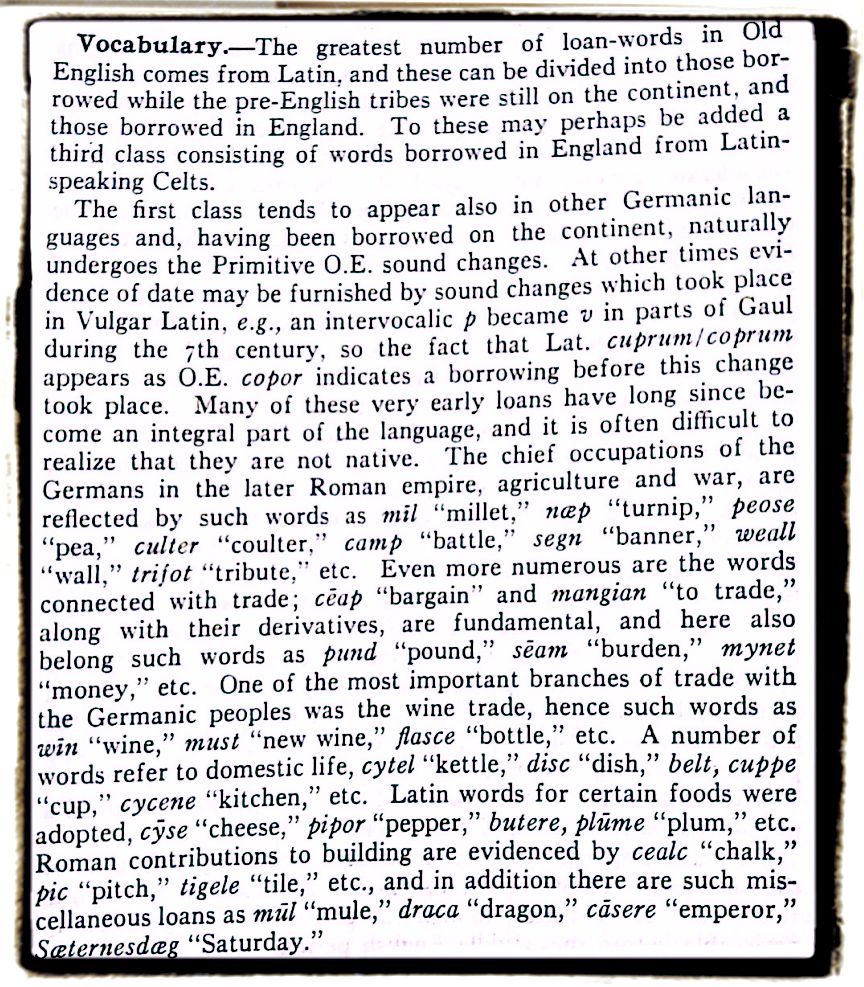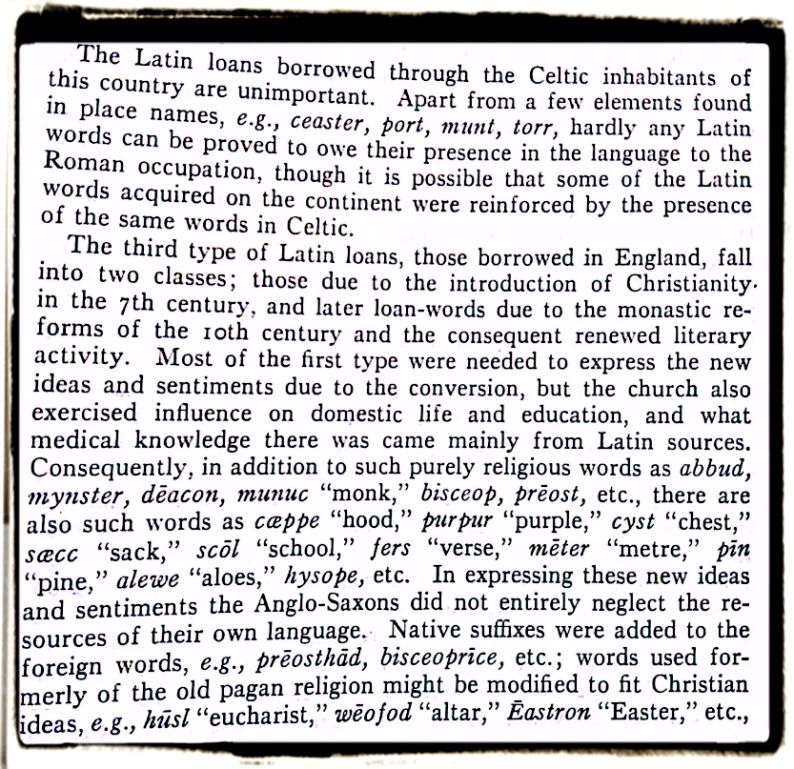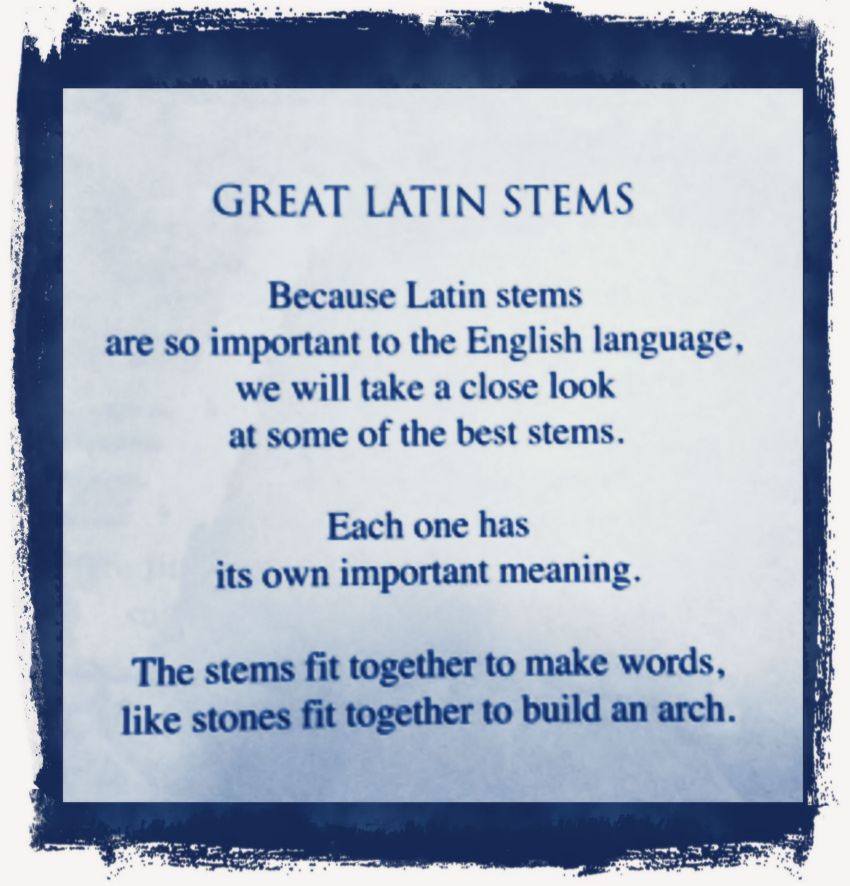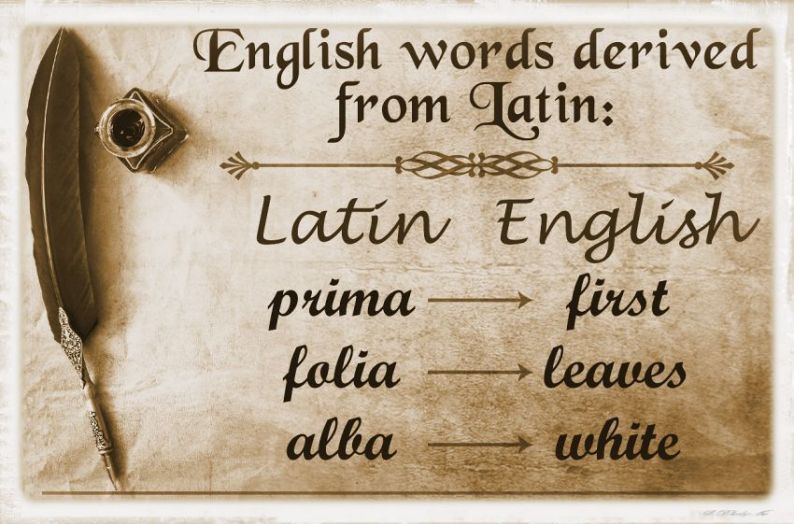
Latin influence in the English Language and vocabulary through the centuries. A computerised study and statistical analysis.
English belongs to the Anglo-Frisian group within the western branch of the Germanic languages, a subfamily of the Indo-European languages. It is related most closely to the Frisian language, to a lesser extent to Netherlandic (Dutch-Flemish) and the Low German (Plattdeutsch) dialects, and more distantly to Modern High German. Therefore English is a Germanic language, having a grammar and core vocabulary inherited from Proto-Germanic. However, a significant portion of the English word hoard comes from Romance and Latinate sources. Estimates of native words (derived from Old English) range from 20%–33%, with the rest made up of foreign borrowings. (These estimates, however, are based on the total raw counts of dictionary entries, where the frequency of use for most non-native words is low to nil.
The English vocabulary has increased greatly in more than 1500 years of development. The most nearly complete dictionary of the language, the Oxford English Dictionary (13 vol., 1933), a revised edition of A New English Dictionary on Historical Principles (10 vol., 1884-1933; supplements), contains 500,000 words. It has been estimated, however, that the present English vocabulary consists of more than 1 million words, including slang and dialect expressions and scientific and technical terms, many of which only came into use after the middle of the 20th century. The English vocabulary is more extensive than that of any other language in the world, although some other languages – Chinese, for example – have a word-building capacity equal to that of English.

Extensive, constant borrowing from every major language, especially from Latin, Greek, French, and the Scandinavian languages, and from numerous minor languages, accounts for the great number of words in the English vocabulary. In addition, certain processes have led to the creation of many new words as well as to the establishment of patterns for further expansion. The true percent of native words used in everyday spoken and written English actually ranges from 75%–90%.
A large number of these borrowings come directly from Latin, or through one of the Romance languages, particularly Anglo-Norman and French, but some also from Italian, Portuguese, and Spanish; or from other languages (such as Gothic, Frankish or Greek) into Latin and then into English. The influence of Latin in English, therefore, is primarily lexical in nature, being confined mainly to words derived from Latin roots.
The number of Latin words, many of them derived from the Greek, that were introduced during the Old English period has been estimated at 140. Typical of these words are altar, mass, priest, psalm, temple, kitchen, palm, and pear. A few were probably introduced through the Celtic; others were brought to Britain by the Germanic invaders, who previously had come into contact with Roman culture. By far the largest number of Latin words was introduced as a result of the spread of Christianity. Such words included not only ecclesiastical terms but many others of less specialized significance.

In the early part of the Modern English period the vocabulary was enlarged by the widespread use of one part of speech for another and by increased borrowings from other languages. The revival of interest in Latin and Greek during the Renaissance brought new words into English from those languages. Other words were introduced by English travelers and merchants after their return from journeys on the Continent. From Italian came cameo, stanza, and violin; from Spanish and Portuguese, alligator, peccadillo, and sombrero. During its development, Modern English borrowed words from more than 50 different languages.
For instance, the great poet John Milton, as a Renaissance man, was profoundly familiar with classical learning and his works abounds with classical references, which are often used to describe aspects of Christian belief. The wide use of classical and biblical sources is an important element of what is known as Milton’s “Grand style”. Other stylistic features contribute to the grandeur of Milton’s epic poetry, epic simile for example is a technique he often employs following the Homeric and Virginian style. Another important element is the language he used. In keeping the high seriousness of his subject, he tended to use solemn and rather grandiose language, instead of plain simple English, so he often used words that derived from Latin or Italian, and also his syntax was heavily influenced by these two languages.
Word origins. A computerised survey of about 80,000 words in the old Shorter Oxford Dictionary (3rd ed.) was published in Ordered Profusion by Thomas Finkenstaedt and Dieter Wolff (1973) that estimated the origin of English words as follows:
Influences in English vocabulary Langue d’oïl, including French and Old Norman: 28.3%
Latin, including modern scientific and technical Latin: 28.24%
Germanic languages – inherited from Old English, from Proto-Germanic, or a more recent borrowing from a Germanic language such as Old Norse; does not include Germanic words borrowed from a Romance language, i.e., coming from the Germanic element in French, Latin or other Romance languages: 25%
Greek: 5.32%
No etymology given: 4.03%
Derived from proper names: 3.28%
All other languages: less than 1%

A survey by Joseph M. Williams in Origins of the English Language of 10,000 words taken from several thousand business letters gave this set of statistics:
French (langue d’oïl): 41%
“Native” English: 33%
Latin: 15%
Old Norse: 5%
Dutch: 1%
Other: 5%
Based on the above, the percentage of Latin words used in formal business context (15%) is substantially lower than that of the dictionary survey (28.24%) due primarily to the effects of linguistic register, where the vast majority of Latin words in English tend to be of a scientific or technical nature, or consist of words which are rarely to never used (i.e. are functionally obsolete).
Loanwords from Latin
The English language has borrowed extensively from the Latin language beginning during the Germanic period before English was English through the Old English period and up to the early Modern English period. The earliest Latin loanwords date from the period before the Germanic tribes invaded England under invite from the Britons. Latin borrowings continued throughout the Old and the Middle English period, above all Latin influenced the new English language thanks to the literary works of Geoffrey Chaucer, because he knew Latin, French and Italian and admired the main authors who wrote in these languages. English again borrowed heavily from Latin during the Early Modern period that coincides closely with the revival of learning of the Renaissance and with the great dynasties of Tudor (1485–1603) and Stuart (1603-1714) during which many scholars imported many Latin loanwords. Although English is a Germanic language, many common and everyday words are of Latin origin.

List of Latin Loanwords
With all the loanwords borrowed from Latin into English, an exhaustive list would be too lengthy to be possible. The following are some of the commonly used Latin loanwords in English:
Agile, abdomen, album, alien, anatomy, animate, animosity, anchor, annual, apostle, area, audio, bacteria, bonus, bovine, butter, Caesar, cancer, canine, capsule, cervix, chalk, cheese, circle, circus, city, civil, chest, church, comet, compensate, color, colossus, complex, consider, contemplate, data, decide, dexterity, deity, discus, disc, disciple, dish, disk, domestic, ego, emperor, equilibrium, erupt, et cetera, excavate, expensive, fauna, feline, feminine, fictitious, flora, floral, formula, fungus, general, genius, genus, gradual, habitual, habitat, honor, id, ignite, immoral, immortality, inertia, infinite, ingenious, insane, interim, janitor, judge, kettle, kitchen, lachrymose, latex, legal, libido, lingua franca, literature, lunar, manual, master, martyr, media, meditate, memento, memorandum, memory, mile, minus, moment, momentum, moral, noble, nocturnal, notorious, opera, orbit, ovum, paper, patron, pauper, pavement, pendulum, peninsula, pepper, percent, persona, physician, plus, pound, propaganda, referendum, regal, revise, rural, sack, series, sex, sickle, similar, simile, status, stimulus, street, subpoena, superego, superintendent, tabula rasa, temple, title, ultimate, vehicle, verbatim, vertigo, vice versa, video, vindicate, wall, wine.
Learn more visiting these useful websites:
https://www.latin-english.com Latin English Dictionary
https://www.etymonline.com Online Etymology Dictionary
You can download the following books on Latin at this page:
Latin Language: Bennett, Charles E.: New Latin Grammar;
D’Oogle, Benjamin L.: Latin for beginners;
Wine, women and songs. Medieval Latin Student’s Songs, including translation and commentary by John Addington Symonds.
Or read other articles about the English Language and Literature:
Christianization of Britain, a full article
English, Greek and Latin, a complete article
The Latin Language, a short history
English Renaissance, the revival of learning
Short History of the English Language
The essence of English Grammar
Short History of the Origin of English
English words origin and vocabulary
History-of-the-English-Language.pdf
British-history-milestones-synthesis
Questions-about-the-english-language
History-of-English-Literature-Summaries.pdf
British_literature_history_chart_summary.htm
General_literature_history_chart_summary.htm
American_literature_history_chart_summary.htm
British_english_history_timeline.htm
More videos;

